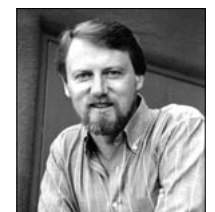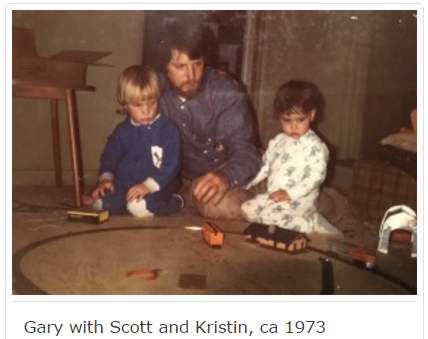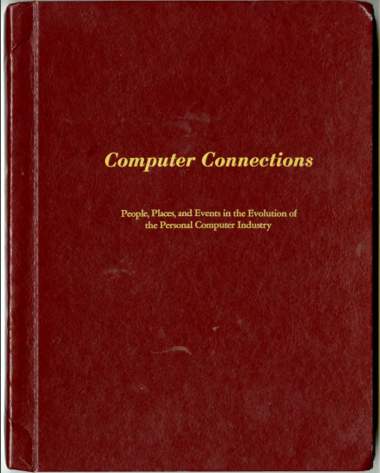| Gary Kildall Memoir Available to Download |
| Written by Sue Gee | |||
| Saturday, 06 August 2016 | |||
|
Gary Kildall was an important pioneer in the early days of the microcomputer revolution and was one of the first people to take microprocessors seriously. He isn't as well known as the other computer creators of his generation but now the Computer History Museum has made available for download part of the draft he had intended as the basis of a book.
Gary Kildall (1942-1994) Gary Kildall, the creator of the CP/M operating system, died unexpectedly in 1994, at the young age of 52. having never published an autobiography. He had, however, distributed copies of a Christmas, 1993 Edition of a memoir titled “Computer Connections: People, Places, and Events in the Evolution of the Personal Computer Industry” to family and friends, noting that it would "go to print in final form early next year, apparently under the auspices of Osborne-McGraw Hill". Ownership of that manuscript passed to Gary’s children, Scott and Kristin who have now given permission for the Computer History Museum to make the first portion publicly available along with previously unpublished family photos. In their introduction Scott and Kristin Kildall write: “Our father, Gary Kildall, was one of the founders of the personal computer industry, but you probably don’t know his name. Those who have heard of him may recall the myth that he “missed” the opportunity to become Bill Gates by going flying instead of meeting with IBM. Unfortunately, this tall tale paints Gary as a “could-have-been”, ignores his deep contributions, and overshadows his role as an inventor of key technologies that define how computer platforms run today. Gary viewed computers as learning tools rather than profit engines. His career choices reflect a different definition of success, where innovation means sharing ideas, letting passion drive your work and making source code available for others to build upon. His work ethic during the 1970s resembles that of the open-source community today. With this perspective, we offer a portion of our father’s unpublished memoirs so that you can read about his experiences and reflections on the early days of the computer industry, directly in his own voice. The excerpt consists of the first seven chapters of the memoir, 78 pages in all documenting his early experience with computers while at the University of Washington, through his time as a professor at the Naval Postgraduate School and as a consultant for Intel and creating PL/M - Programming Language for Microcomputers, a breahthrough which used compiler technology up to the early days of Digital Research (DR), the start up he established with his wife, Dorothy.
A chapter is devoted to CP/M and in the next one we learn how lasting contribution to computer technology came about due to Glenn Ewing, one of Kildall's graduate student's needing to produce a disk operating system in a hurry: Glenn came to my tool shed computer room in 1975, so we could "adapt" CP/M to the IMSAI hardware. What this means is that I would rewrite the parts of CP/M that manage things like diskette controllers and CRTs. Well. come on, I'd already done this so many times that the tips of my fingers were wearing thin, so I designed a general interface, which I called the BIOS (BASIC I/0 System) that a good programmer could change on the spot for their hardware. This little BIOS arrangement was the secret to the success of CP/M. With the BIOS in place, a programmer could make CP/M work with their specialized hardware. With all those hobbyists out there, believe me, there was no shortage of specialized hardware. Glenn and I built a BIOS that afternoon and stuck CP/M on an IMSAI. In a section on The Early Days of Microsoft we are given an insight into the relationship between Kildall and Bill Gates: Bill came to me in Pacific Grove one day in 1977 to discuss his current quandary about relocation of his Microsoft company. We invited him to stay that night at our home. Dorothy fixed a nice roast chicken dinner, and we had light conversation. Bill told us about the tickets he had received driving at high speed in his Porsche 911 through the main street of Albuquerque. We found a common topic since I. to my misfortune, also enjoy speed of the automotive type that sometimes, but not often, results in an encounter with The Law. At this time, I was quite friendly with Bill, and we always talked of the "synergism" of our two businesses. But, quite frankly, I was always apprehensive of his business moves, as I found his manner too abrasive and deterministic, although he mostly carried a smile through a discussion of any sort. In a later passage he wrote: Monetarily, Bill had the proper approach to get a stack of bucks, and lose a bunch of friends in the meantime. I guess that's ok. Other people discussed in the course of the excerpt include Grace Hopper, described as a "lovely lady" who: was self-proclaimed to be the first programmer, and I believe her. She was quite elderly when I met her, but wore the crisp dress uniform of the Navy each time I saw her. She helped invent COBOL, that business language used throughout the world today. She was a brightly clever, petite gray-haired lady with a wit and brain sharper at her age than most who were half her's. She was like having a charming grandmother who could talk your socks off about computers. Quite a combo, indeed. All her stories were true, captivating, and always drew a crowd. He also liked Robert Noyce, founder of Intel: Bob Noyce was a clever, somewhat silent, gray-haired guy who mostly wore a white lab coat to cover his casual demeanor. At first, I must admit that I liked him because he was a pilot.... Bob was a friend. He, like all of us, made some decisions that are right, and some that could have made the future unfold in a different manner. But, most of all, Bob treated his people with dignity. He had the foresight to build an industry in microprocessors. I was very sad when he died recently. This portion of the memoir takes us to the end of the 70s and it doesn't give details of what caused the deal for IBM to contract DR's CP/M as one of the operating systems for the IBM PC to fall through. The apocryphal story that he was enjoying a day off flying his plane, is now seen to be an over simplified, or even falsified account, of the events. Whatever happened it had a lasting impact on the future of the software industry. Gary Kildall died after a blow to the head during a biker brawl at a bar in Monterey in 1994 so there is more of his story to tell. However it doesn't seem as though more of his memoir will be revealed. Scott and Kristen Kildall write: We have chosen to release only the first portion of his memoir. Unfortunately Gary’s passion for life also manifested in a struggle with alcoholism, and we feel that the unpublished preface and later chapters do not reflect his true self. If you want to read more about events in his later life and the further development of CP/M, They Made America by Harold Evans, Gail Buckland, and David Lefer has an excellent chapter on this topic.
You can read more about Kildall's life and contributions in Gary Kildall - CP/M, Digital Research and GEM. This 1995 video is a special edition of Computer Chronicles, a series which Kildall had co-hosted since its inception, was devoted to Gary Kildall's story. Introduced by Stewart Cheifet. it includes comments by Tom Rolander who was the first employee of Digital Research; Alan Cooper, a CP/M applications developers; as well as Gordon Eubanks and others.
More InformationIn His Own Words: Gary Kildall Related ArticlesGary Kildall - CP/M, Digital Research and GEM 30 years ago - Microsoft signs contract with IBM to create MS-DOS
To be informed about new articles on I Programmer, sign up for our weekly newsletter, subscribe to the RSS feed and follow us on Twitter, Facebook, Google+ or Linkedin.
Comments
or email your comment to: comments@i-programmer.info |
|||
| Last Updated ( Saturday, 06 August 2016 ) |




